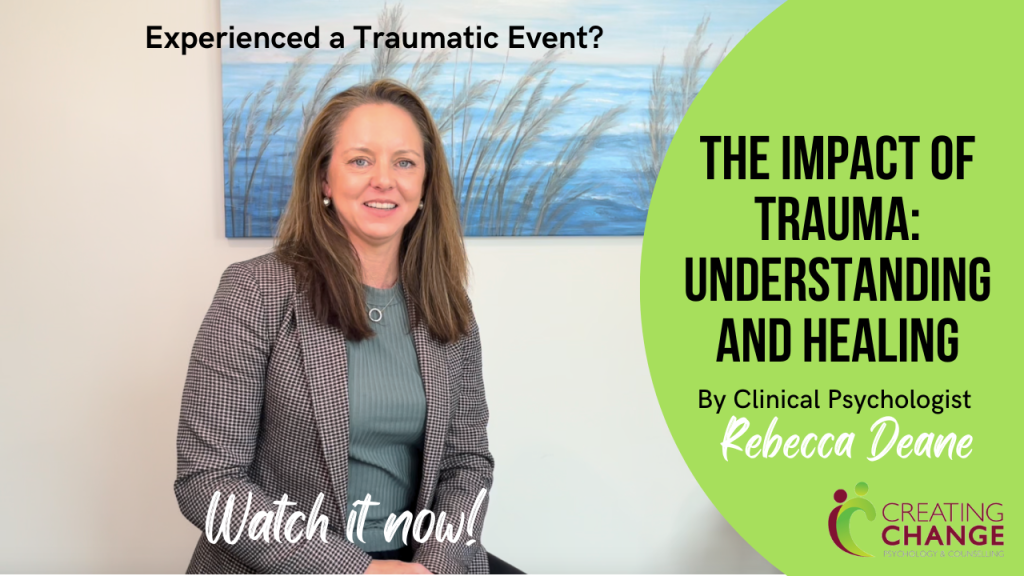
Eye Movement Desensitisation and Reprocessing (EMDR) therapy is a therapeutic approach designed to help individuals process and heal from distressing life experiences and traumas.
EMDR uses bilateral stimulation, such as guided eye movements, to assist the brain in reprocessing traumatic memories, reducing their emotional charge, and integrating them into a healthier narrative.
How Does EMDR Therapy Work?
EMDR therapy involves a series of structured sessions where the therapist guides you through recalling distressing events while simultaneously engaging in bilateral stimulation. This process helps to desensitise the emotional impact of the memories and reprocess them in a way that promotes healing.
The stages of EMDR therapy include:
- History Taking and Treatment Planning: Understanding your background and identifying target memories.
- Preparation: Building a therapeutic relationship and teaching you coping mechanisms.
- Assessment: Identifying specific memories and the negative beliefs associated with them.
- Desensitisation: Using bilateral stimulation to reprocess the memories.
- Installation: Reinforcing positive beliefs to replace the negative ones.
- Body Scan: Ensuring that no residual tension or distress remains.
- Closure: Helping you return to a state of equilibrium.
- Re-evaluation: Reviewing your progress and planning future sessions if needed.
What is EMDR Therapy Used For?
EMDR therapy is versatile and effective for a wide range of conditions, including:
- Trauma and PTSD: Reducing the intensity of traumatic memories and associated symptoms.
- Anxiety and Panic Attacks: Alleviating anxiety triggers and reducing panic episodes.
- Depression: Addressing underlying issues and improving mood and emotional stability.
- Phobias: Diminishing irrational fears and avoidance behaviours.
- Stress Management: Helping you handle daily stressors more effectively.
- Grief and Loss: Processing emotions related to significant losses.
- Performance Anxiety: Enhancing performance in various fields such as work, sports, and public speaking.
- Addictions: Supporting recovery by addressing the root causes of addictive behaviours.
How We Can Help
At Creating Change, our team of EMDR Accredited and compassionate therapists are here to help you with whatever your needs or challenges are, and tailor our therapy sessions accordingly. If you’re already seeing a psychologist, you can engage in a round of EMDR to compliment your current therapy sessions. This is another option if you’re feeling stagnant in your mental health journey and not getting the results you want. We create a safe, supportive environment where you can explore and heal from your past experiences.

How EMDR Therapy May Help Your Symptoms
EMDR therapy has been shown to offer numerous benefits, including:
- Reduced Emotional Distress: Lessening the intensity of negative emotions tied to past events.
- Enhanced Coping Mechanisms: Building resilience and better ways to handle stress and challenges.
- Stronger Relationships: Improving your ability to connect with others.
- Increased Sense of Well-Being: Enhancing overall mental and emotional health.
The Next Step: Healing
Ready to transform your life and move forward with greater peace of mind? Here’s what to do next:
- Schedule a Consultation: Contact us today to book your initial consultation.
- Reach Out for More Information: Call, email, or fill out our contact form to get answers to any questions you may have.
- Stay Connected: Follow us on our social media profiles for updates, tips, and a supportive community.
At Creating Change, we are committed to supporting you every step of the way.
Don’t wait – take the first step towards a brighter, healthier future.
Meet Our EMDR Psychologists




Helpful Resources



